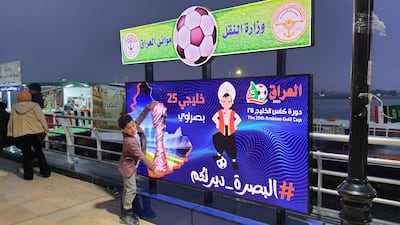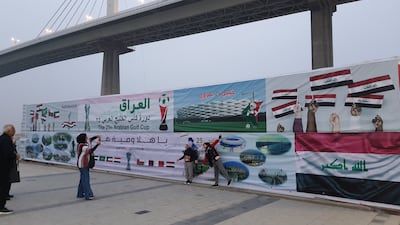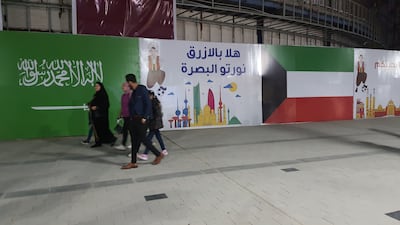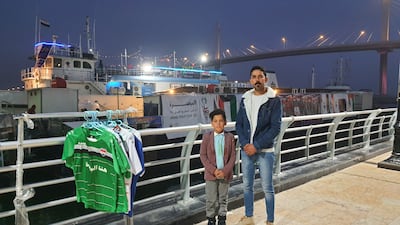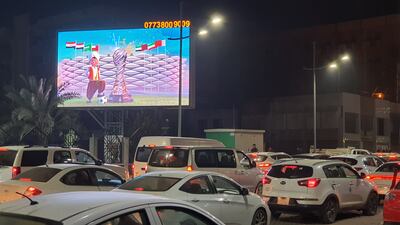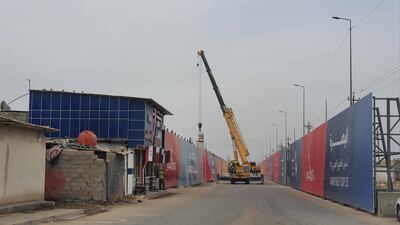Football's Gulf Cup returns to Iraq to much fanfare on Friday, with Iraqis hoping the tournament in Basra can help to spur a national recovery after four troubled decades.
But the event has run into controversy just days ahead of its opening ceremony.
It has been marred by allegations of mishandling ticket sales, unpopular attempts by authorities to cordon off informal settlements and calls by Islamists to ban singing and dancing.
The 25th Gulf Cup is the first major football tournament to be hosted by the war-scarred Iraq in more than 40 years.
It will run from January 6 to 19, with teams from Iraq, UAE, Saudi Arabia, Kuwait, Bahrain, Oman, Qatar and Yemen competing for the cup.
Iraqi fans are excited for the tournament to start. The country last played host in 1979 in Baghdad — when it won one of its three tournament trophies.
Tickets sold at 10 times the price
Late last month, Iraq launched online ticket sales in four categories, with prices ranging from $10 to $30.
Since not all the fans are able to buy tickets online, direct sales through travel agencies in Basra were also launched to cover high demand.
However, many fans say tickets are still out of reach at the official price, with thousands have been channelled to the black market.
Some say prices hit as much as $300 to $400 for VIP seats for the opening ceremony.
Ahmed Al Iraqi has been travelling daily from his hometown Qurna, about 80km northwest of Basra, to buy a ticket, but has yet been unable to buy one.
“We visited several travel agencies but after queuing for several hours they say they run out of tickets,” Mr Al Iraqi, 29, told The National.
“When we get in touch with them on messaging apps or through dealers, they offer tickets at high prices as much as tenfold [the official price].
“If immediate measures are not taken by authorities to tackle this issue, it will definitely ruin Iraq’s reputation.”
Others such as Mustafa Mohammed had no choice only to pay what the dealers asked for.
“I spent hours and hours queuing and got nothing so I bought a ticket for 60,000 Iraqi dinar [about $40], which should have been priced at 15,000 Iraqi dinar [about $10],” Mr Mohammed, 30, added.
But not all fans have had such problems — Mahdi Riyadh said he secured three tickets as soon as online selling started.

"It was easy, like counting from one to ten", Mr Riyadh, 23, told The National. "I was lucky enough to get the tickets for the opening ceremony. It is nice to introduce the online selling for the first time in Iraq."
Iraqi Football Federation spokesman Yousif Faal confirmed that tickets are being sold at the black market.
Mr Faal said the Arab Gulf Cup Football Federation granted tickets sale rights to a British company, meaning Iraq cannot control the flow of tickets.
“It’s a new experience for us,” he told The National. “The demand is high and seats are limited and there are people who exploit such situation to make money.”
Iraq's National Security Service warned on Monday it would chase the dealers, announcing the arrest of at least on person in Basra who was selling tickets at eight times the normal price.
Screens to cover settlements
Amid the chaos and lawlessness that engulfed Iraq after the 2003 US-led invasion that toppled Saddam Hussein, sprawling informal settlements sprung up, occupying in government properties and parks.
There are about 3,700 informal settlements across Iraq, according to Iraqi Ministry of Planning.
Baghdad has the largest share of about 1,000 informal settlements followed by Basra with 700 ones, the ministry’s figures show.
Many of these settlements are located in central Basra and can be seen while traveling in the city’s main roads and near stadiums.
Now local authorities are erecting metal screens and wooden panels to ensure the settlements are hidden from Gulf Cup visitors, sparking criticism from citizens.
“Are we a source of shame in this city?” said Hassan Ismael, a dweller in Al Kawthar settlement near Al Minaa Olympic Stadium, one of two avenues where matches will take place.
Mr Ismael, 28, lives in a nearly 125 square meter structure with his 12-member family. A new wall has isolated the settlement, covering his store which rents out construction equipment.
“The shame is that they have not solved this problem untlil now. They should have used that money to help us by giving lots and financial aid to build small houses,” the father-of-two said.
The local government would not divulge the total cost of the walls, but former minister and politician from Basra Wail Abdul Latif put the number at 480 billion Iraqi dinar (about $311 million) during an interview with a local TV station.
Basra Governor Asaad Al Eidani defended the move in an interview with state TV on Monday, calling the move a way of “beatifying the city”.

Organisers have also faced calls from some religious leaders to ban singing and dancing at the tournament.
The strongest comments came from Sheik Hadi Al Shawki who's affiliated to the Sadrist Movement, a political group enjoys the backing in influential Shiite cleric Moqtada Al Sadr.
“Singing is prohibited in Islam and our traditions,” Mr Shawki said to worshippers during Friday sermon. “Since that 97 per cent of the population are Muslims then it is obligatory to respect that identity.”
He suggested to start the ceremony with verses from the holy Quran “since all participating countries are Muslim”.
He also criticised men and women being allowed to mingle inside stadiums.
Ahmed Aqeel disagrees.
"For centuries, Basra is seen as a city of love and coexistence," Mr Aqeel, 54, said. "We know Islam teachings very well and it is not a violation when we want to have a decent ceremony.
"We will celebrate the event the way we love."


